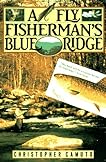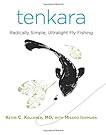We make the same mistake in our fishing that we do in our faith: we think we can earn it. We believe that if we know enough, that if we pick the right fly and make the right cast, that we deserve a fish. I've caught too many fish while doing boneheaded things to believe that's how it works, but I still do.
On Saturday I made a nearly perfect-for-film cast, sidearm under an overhanging branch without snagging the trees behind me to the troutiest spot I'd seen all day. I had the right fly on and I got a perfect drift, the line landing with just enough slack in it to prevent that nearer, faster current from tugging the fly. And nothing happened. I had done it right and nothing happened. I spent an hour that morning fishing respectably with no luck.
(We'll ignore the fact that for my first couple casts, I didn't realize I had missed a guide while stringing my line or that it took me what felt like most of the morning to get a nail knot I was satisfied with.)
Much of the time fishing works the way we expect. We do the right thing at the right time, and our reward is a fish, a fish we earned and deserved. Then there are days when it doesn't, and I'm thankful for them.
Were fishing mechanical, it would lose it's magic; it would be a puzzle be to solved and not a grace to be received. And, after all, it's all grace: that flash of fish, that tightening of line. The treasures offered up unexpectedly and undeserved from someplace to which we're only granted fleeting access by something bigger than our own cunning.
I hiked back to the parking lot. At the very worst, I'd spent a short morning in the mountains, but I knew I had a little time to fish downstream from the bridge. I made my way far enough to feel like I'd reach my own patch, throwing quick casts into a few little spots only out of routine. When I found the pool, I threw my line out, looking less for fish than for whatever release comes with the Blue Ridge spring. The fly went under and my line went tight.
Monday, April 6, 2015
Monday, May 20, 2013
The Confidence Lure
I had only an hour or so to get on the water, so I grabbed some stuff quickly and headed out. I noticed that my favorite lure wasn't in the box but I thought I must be missing it since I always have a small Rebel floating minnow with me. It's a strange lure that's presumably on its way out. It's similar to the standard Rapala, but no one's ever given it respect. Even so, it's been my confidence lure for nearly two decades now. I've caught about as many species of fish as I've fished for on it, often pulling in more and bigger fish than I'd have expected. As long as I have it with me, I feel like I'll have some success.
So when I get lakeside and it's not there, I'm not sure what to do. It's my default lure for this situation, trying to catch small bass, bream, and crappies over and between some vegetation, near a fallen log that's eaten more than a few hooks. I suddenly feel that, despite the nice weather, my time would have been better spent tying flies or taken a nap. It's a silly proposition, of course – that only one lure will catch fish – but it's one anglers often face. We all have our go-to flies, baits, and lures. Sometimes something will work its way into or out of this category, but it takes time. And lots of fish.
Years of experience, countless books read, obscure resources consulted, etc. And here I am, convinced of failure and unable to pick out even one of the 20 or so little lures on me that I think will work. Even fishing for 'gills. I make a careful selection. A few casts later, a swirl. A few casts after that, a bass. That's all it takes, and I've got a new back-up lure in the arsenal. The rest of the day doesn't go so well, but I'm not surprised. Leaving, though, I don't have to blame it on the missing lure, but on the weather, the early season, the choppy waters, the preponderance of disc golfers, and the like.
It's that simple to becomes satisfied with a new lure, though, because we want to scam ourselves. We want to attribute both more and less to our lure selection than necessary. Less, in thinking that our magic gimmick will work, and more, by thinking that there's something more elevated to the whole process than simply matching a lure to prey and conditions.
In buying into this system, though, we eliminate the rewards of experimentation. When we fish a bit and catch 10 fish on a lure, we stick with it, never knowing what we'd have caught had we switched lures early on. Could we have caught a dozen? Bigger fish? A different species. We don't know because we like to keep our assurance of success during that outing, even at the cost of discovery. We want to feel right about thing. Lure selection, after all, is largely a confidence game.
So when I get lakeside and it's not there, I'm not sure what to do. It's my default lure for this situation, trying to catch small bass, bream, and crappies over and between some vegetation, near a fallen log that's eaten more than a few hooks. I suddenly feel that, despite the nice weather, my time would have been better spent tying flies or taken a nap. It's a silly proposition, of course – that only one lure will catch fish – but it's one anglers often face. We all have our go-to flies, baits, and lures. Sometimes something will work its way into or out of this category, but it takes time. And lots of fish.
Years of experience, countless books read, obscure resources consulted, etc. And here I am, convinced of failure and unable to pick out even one of the 20 or so little lures on me that I think will work. Even fishing for 'gills. I make a careful selection. A few casts later, a swirl. A few casts after that, a bass. That's all it takes, and I've got a new back-up lure in the arsenal. The rest of the day doesn't go so well, but I'm not surprised. Leaving, though, I don't have to blame it on the missing lure, but on the weather, the early season, the choppy waters, the preponderance of disc golfers, and the like.
It's that simple to becomes satisfied with a new lure, though, because we want to scam ourselves. We want to attribute both more and less to our lure selection than necessary. Less, in thinking that our magic gimmick will work, and more, by thinking that there's something more elevated to the whole process than simply matching a lure to prey and conditions.
In buying into this system, though, we eliminate the rewards of experimentation. When we fish a bit and catch 10 fish on a lure, we stick with it, never knowing what we'd have caught had we switched lures early on. Could we have caught a dozen? Bigger fish? A different species. We don't know because we like to keep our assurance of success during that outing, even at the cost of discovery. We want to feel right about thing. Lure selection, after all, is largely a confidence game.
Sunday, September 11, 2011
Keither Fulsher -- Thunder Creek Flies
 Thunder Creek Flies: Tying and Fishing the Classic Baitfish Imitations by Keith Fulsher
Thunder Creek Flies: Tying and Fishing the Classic Baitfish Imitations by Keith FulsherMy rating: 4 of 5 stars
I'm probably overrating this book at 4 stars, but there's solid writing, great pictures, and clear tying descriptions. I would have enjoyed seeing more photos of the baitfish the patterns match, and I thought some of the non-recipe sections could have been a little more detailed, but I'll admit they're sort of tangential to the point of the book.
I haven't tied or fished any of the patterns yet, but I'm looking forward to doing so.
View all my reviews
Thursday, May 12, 2011
Christopher Camuto -- A Fly Fisher's Blue Ridge
 A Fly Fisherman's Blue Ridge by Christopher Camuto
A Fly Fisherman's Blue Ridge by Christopher CamutoMy rating: 4 of 5 stars
It's a very pleasing read, and not only because much of the book takes place on what I'm starting to think of as my home trout water. Camuto does a great job of mixing the scientific research with wilderness and historical narrative. Some of the research specifics might seem a little dated, given its focus on acid rain, but it's still a relevant topic and message (though I use that word a little hesitantly, as there's little of the polemic here).
View all my reviews
Sunday, April 3, 2011
Harry Murray -- Virginia Blue-Ribbon Streams
 Virginia Blue-Ribbon Streams: A Fly-Fishing Guide by Harry Murray
Virginia Blue-Ribbon Streams: A Fly-Fishing Guide by Harry MurrayMy rating: 3 of 5 stars
This is good for one it is, a relatively detailed overview of some of the major streams in Virginia. It's got useful details and good artwork, but the problem is simply that there are several of these sorts of books, and at least one that's far more comprehensive. If you can pick this one up cheaply, it's probably worth it to fill out your research, but it's probably inessential.
View all my reviews
Wednesday, March 23, 2011
Kevin C Kelleher, Misako Ishimura -- Tenkara
 Tenkara: Radically Simple, Ultralight Fly Fishing by Kevin C Kelleher
Tenkara: Radically Simple, Ultralight Fly Fishing by Kevin C KelleherMy rating: 4 of 5 stars
It does its job perfectly, introducing tenkara fishing in a way that's as simple as the sport warrants, yet still relatively comprehensive. Experienced anglers won't be bored, and new anglers won't be overwhelmed.
You could probably just about go from knowing nothing to catching a fish simply by using the book. That said, it works best in the context of other fishing instruction/literature (and, of course, nothing teaches like time on the water, ideally with an experienced person). There's plenty of more room for talk about reading the water, etc. My only other wish is that the knot illustrations had been clearer (or shown more steps).
View all my reviews
Tuesday, March 15, 2011
Roderick Haig-Brown -- A River Never Sleeps
 A River Never Sleeps by Roderick L. Haig-Brown
A River Never Sleeps by Roderick L. Haig-BrownMy rating: 4 of 5 stars
It's pretty easy to see why this one's so highly regarded. Haig-Brown comes closer to over-writing at times, but doesn't, and everything's pretty straightforward in a rewarding way. There are more than just fishing exploits, but he writes those extremely well. His successes are rarely cause for self-congratulation, and his failures are never cause for misery. He seems to be perpetually exploring and learning, and it's engaging. By the mid-point of the book, I was pretty sure that I would have enjoyed fishing with Haig-Brown, and by the end of the book I was convinced I was born a half century too late, even if (especially if?) it would have meant roughing it for a living.
I think this one works best when it's read slowly and over a period of time, properly absorbed. There are a few spots that drag, but otherwise you'll want to both keep reading and keep slowing down.
View all my reviews
Subscribe to:
Posts (Atom)
